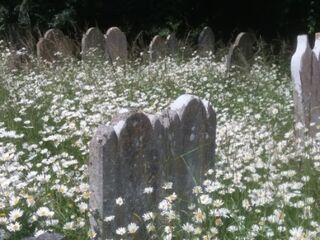Coronavirus Disease 2019
Whoopee! We're All Gonna Die
A stark but useful reminder from COVID-19.
Posted July 6, 2020

Nobody lives forever. Think about it for a second. No one from the year 1900 is still alive today, and no one living today will be around in 2140. Our days are numbered; but naturally, we try not to think about it until the actual plain reality of death, our own and that of those we love, is somehow brought forcefully home. For better or worse, COVID-19 offers a bleak reminder of this uncomfortable, yet undeniable, fact.
At school in the sixties, we were told about the famously scary "4-Minute Warning" of Soviet nuclear attack. What would you do," we asked each other, "given just four minutes to live?" Some children were drilled in quickly climbing under their desks; a defensive action that would, of course, have been utterly futile against the devastation of atomic weapons. Even at 12 years old, having seen pictures of Hiroshima, we were sure about that.
Later, still wary of authority figures, with an unwinnable war happening in Southeast Asia, we were mesmerised by a rousing refrain from Country Joe McDonald and his band, The Fish, at the 1969 Woodstock Festival:
And it's one, two, three, what are we fighting for? Don't ask me, I don't give a damn.
Next stop is Vietnam;
And it's five, six, seven, open up the pearly gates. Well there ain't no time to wonder why
Whoopee! We're all gonna die.
Was this purely sarcasm, we might now wonder, or is it indeed possible to be exultant in the face of death? Ancient Greek philosophers certainly thought so, teaching their students to contemplate death as an essential exercise on the pathway to wisdom. To awaken each morning and reflect on the genuine possibility of dying on this very day, gives life an edge; if not from a deadly virus, then perhaps through an accident, a heart attack or stroke.
Recognising this fact makes you feel vibrantly alive because—fully aware too that your life might equally extend for many years to come—it provides a uniquely healthy perspective on day-to-day matters, suggesting how, as the wise ones of old would insist, we can stay focused, remaining fully alert, moment by moment, seamlessly linking past and future together in the course of one meaningful and rewarding lifespan.
An hour or so before he died of lung cancer, my grandfather's last words to me were, "See you in four years." He was smiling. I don't think I had ever seen him so happy. He knew his race was run and was content. I was in my twenties, and spent the next four years wondering what he meant; asking myself in particular, "Was he predicting my death?"
I started thinking about dying, and soon realised that my end would definitely come one day, whether in four years or forty; and this reflection made me ask additional important questions: "How did I want to live my life?" "What were to be my priorities, my values, and my ambitions?" It took a long time to process all this and fully accept my mortality as I was carried through a series of transformative barriers—of anger, of fear, and finally of sadness—while I got used to the idea of giving everything up.

These were growing pains, so to speak, for I see this process of grieving for myself as healthy rather than morbid, certain that I eventually emerged a happier, and maybe wiser, person; better-attuned, for example, to the suffering and well-being of others. The Greeks knew that confronting death without flinching can teach a person much about how to live well, finding a pathway to wisdom, joy, peace, and contentment. The prospect of death makes everyone equal, and seems to bind people together, despite any obvious differences in age, gender, skin colour, belief system or anything else. A life without that profound sense of connection, which is not lived with a willingness to make oneself useful to others (especially those who are suffering in body, mind or spirit), is revealed as a life hardly worth living, for there is nothing that makes a person happier than doing something kind and good for somebody else. You may reap a generous smile and a "thank-you," but even anonymous and unremarked gestures of goodwill tend to generate a heart-warming inner glow.
Retaining focus on the present moment enables a person to let go of burdensome worries from the past, and grow free of excessive concern over problems (real or imaginary) that may loom in the future. This is a vitally liberating way to be. The threat of COVID-19 offers a stark but useful reminder of our frailty. Take heart and remember that death, when it comes, occupies only a moment. Until it arrives, we must try and live to the fullest.
After a series of strokes, my grandfather had been paralysed and unable to walk for many years before he got cancer, giving him plenty of time to contemplate both living and dying. How marvellous that, when death eventually reached out for him, he welcomed it with joy and a smile.
Copyright Larry Culliford
References
Larry's new title, 'The Big Book of Wisdom', was published by Hero Press on 19th March 2020. See his website for more information
Larry supports the World Wide Wave of Wisdom.
Larry gave the inaugural SpIRE Library Lecture in Dublin on 5th March 2020. You can listen to it here (48 min) or read it here.
Watch Larry on You Tube in three short videos on psychology and spirituality.




